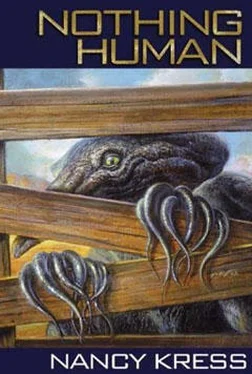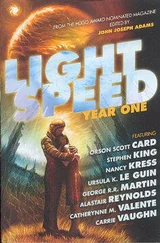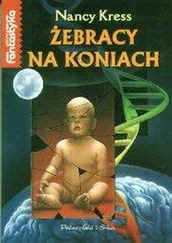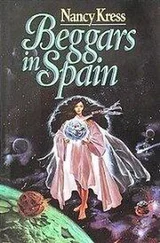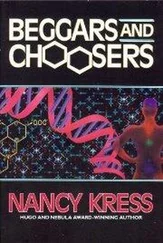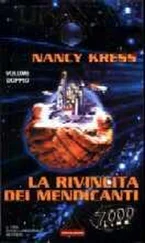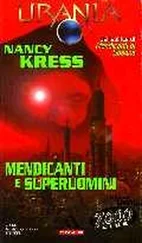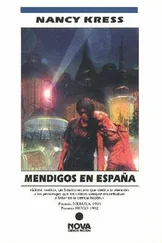He didn’t meet her eyes. “I can’t. I know you don’t understand, Theresa.”
“Fucking right I don’t. This woman isn’t even an M.D. And you of all people should know that a bunch of genes aren’t sacred!”
Scott lost his temper. “It’s because I know how temporary a ‘bunch of genes,’ as you disparagingly call it, can be that I believe what I do! Those are people those girls are carrying, damn it, no matter what you say! If those engineered babies aren’t people, then neither are you or me!”
“Shut up, they’ll hear you in there. So what are you going to do, Scott, alert a vigilante religious group? Abortions in progress! Murder the killers so they can’t murder a bunch of non-breathing tissue!”
Scott turned away. “Let me be, Theresa. You know damn well I won’t say anything to anybody. But let me have my beliefs. You have yours.”
“Mine don’t make two frightened girls spread their legs for an unlicensed stranger.”
“Let me be!”
“Okay, Scott,” Theresa said wearily. “I’ll let you be. I need you. The other girls need you. Just so long as you know that you’re clinging to a selfish, irrational, superstitious belief for your own comfort, no matter who else suffers.”
Scott strode away, toward the open range. Almost sunrise—he shouldn’t go too far. Fuck it. Let him get lost and roast in the sun that was as unrelenting as he was.
In Amarillo, Theresa waited upstairs with Madison while the abortionist took Jessica downstairs. Jessica, her bravado stretched thin, scowled and tossed her head. Madison sat completely still, saying nothing, eyes wide and frozen.
“Maddy,” Theresa said, the old name rising, unbidden, from some well of memory, “it won’t hurt. She has good equipment and reasonable pharms.” Which was why it cost so much.
Madison didn’t answer.
Half an hour later they were called down. Jessica lay on a mattress on the floor, covered with a light blanket. She was smiling. “I’m all right.”
‘Yes,” Theresa said, wondering what she was feeling. She had borne five children, all joyously. Even Spring, born in such a hard time that the season he was named for had been the only good thing happening anywhere around Theresa.
“And I’m not pregnant,” Jessie said, without ambivalence.
“It went very well,” the woman said crisply. “She can travel in a few hours, I think. Do you want the tissue?”
“No!” Theresa said.
The woman shrugged. “Some people do. Now you, young lady. This way.”
“Wait,” Theresa said, “I do want it.” She needed to look. She knew what a three-month fetus looked like; this was her only chance to see if what the girls carried was indeed normal, or if it was some sort of… what?
The woman pointed to another curtain and led Madison away.
Theresa made herself go through the curtain. A dark blue plastic box sat on a table, its cover beside it. She peered in, and her eyes filled with relieved tears. Normal.
She should take one of the fetuses for Scott, she realized belatedly. He would want the genes. No, he wouldn’t, not this way… not Scott. Or would he? Which was stronger, the religious or the scientist?
Suddenly she knew that whatever Scott wanted, she couldn’t carry this thing back with her on the train. She just couldn’t. This clump of genetically engineered tissue, this dead baby.
She went back to sit by Jessica, who had fallen back asleep. Theresa studied the young face smoothed into blankness by sleep. Forty years ago she had been afraid of Jessica. Jessica the bully, quick with her fists, sarcastic about everything, dangerous and despicable. Forty years ago. Theresa reached out and smoothed a few stray hairs back from Jessica’s forehead.
Time passed. Too much time — Madison was taking much longer than Jessie had. Theresa got up and made her way through the maze of curtains. At the end she found an actual door, wood set into the foamcast wall, and went through it.
“Use the calatal!” cried a woman Theresa hadn’t seen before. She and the abortionist were applying various pieces of equipment to Madison, unconscious on a table. There was blood everywhere, way too much blood. The smell of it, metallic and hot, hung in the air.
“Get out!” the second woman yelled at Theresa. “You’re not sterile!”
Theresa blundered back out the door. She stood there, not breathing, for what seemed like hours. When the door finally opened, Theresa already knew.
“Unexpected tearing,” the abortionist said unsteadily. “It’s never happened before, I couldn’t stop it, I tried and tried… I’m so sorry…”
A sound behind her. Theresa turned to see Jessica leaning against the wall. “Madison’s dead, isn’t she?” Jessica said, and when no one answered, Jessica—the bully, the truculent—cried and cried, and would not be comforted.
The rest of the summer brought many good things. It didn’t matter. Every night Theresa dreamed of Madison’s face. Not even the birth of Senni’s child in October made a difference to Theresa’s mood, which made no sense. Senni was her daughter, the new child her granddaughter. Madison was only someone Theresa had known a long time ago, in another time and place.
Senni had an easy birth. The baby was healthy, perfect, strong despite being three weeks premature. Senni named her Clari, after nothing in particular.
Patients came to Scott from towns up to fifty miles away. It turned out he had bought a small ad on the Net. By the beginning of November he was going into Wenton three days a week to hold “office hours” at a tiny rented room. He bought a horse for this trip, helped by Jody, who also taught him to ride. Fortunately, Scott was a natural. There was a lot of work: the warming and increased rain had had brought malaria and dengue fever this far north. Simple diseases to treat, even to vaccinate against—if you had the knowledge and the drugs.
The delivery of drugs was only intermittently reliable. There was no Post Office anymore. Information went by the Net; packages went by the few struggling private companies that exploited the rail circuit. Scott ordered double amounts in staggered deliveries; some got through. Eventually.
He charged patients according to what he learned about them on the Net. Often the fee was paid in welcome foodstuffs or livestock. As his reputation spread, Scott began to get rich people from the enclave outside of Ruidoso. Except for buying drugs, Scott turned every credit he made over to Theresa for the farm.
The crops flourished in the summer heat and new rain, despite the punishing daily wind and violent storms. The harvest was rich. Theresa was now beyond subsistence farming, and ten years ago that had been a glittering goal. The warming had killed billions of people, one way or another: geographic dislocation, epidemic diseases, political collapse, random violence. The war had killed billions more. But Theresa was going to have her best year ever.
Winners and losers, she thought, and her mood did not improve.
At the beginning of October, Bonnie Carson and Julie Cunningham arrived back at the farm, brought by old Tom Carter from Wenton.
“Theresa, these girls would rather be with you,” Tom said, his ancient, pale blue eyes giving away nothing.
“Come in, Tom,” Theresa said. She stood in the cool dawn, already dressed, and bit off her questions until she was alone with the girls. You didn’t burden outsiders with family troubles.
“Got to get back,” Tom said.
Theresa glanced at the brightening sky. “You can’t now. Not in that open cart.”
“I’ll spend the day at the Graham place,” Tom said, not looking at her. The Grahams owned the next homestead; Tom could make it there before the punishing wind began. Theresa understood. Tom didn’t want to be around whatever was going to happen next any more than Theresa did. She, however, didn’t have a choice.
Читать дальше
